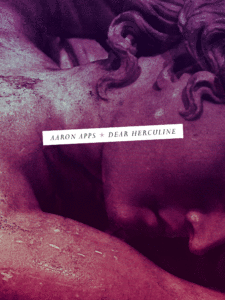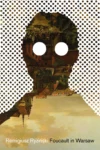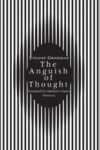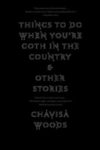Aaron Apps’s new book of epistolary prose takes the form of a series of letters addressed to Herculine Barbin, a nineteenth-century inter-sex person immortalized by Michel Foucault’s rediscovery of their memoirs. Written while simultaneously studying Barbin’s memoirs and grieving for a close friend, Dear Herculine interweaves Apps’s life experiences with those of his subject. It does so, what’s more, in pulsating, eruptive, and often nauseating prose. Apps co-opts the epistolary form to stage a torrid meditation on the condition of inter-sex embodiment, a meditation that accesses an abject dimension of bodily life repressed in quotidian (that is, quotidianly gendered) corporeal experience. The ungenderable body in Dear Herculine becomes visible as a sloppy patchwork of blood, foodstuffs, lipids, vegetal matter, and sweat, an abject amalgam of excreta. The achievement of the book, however, is to reclaim abjection, to posit embodied abjection as an erotically viable dimension of experience, and very particularly, of queer experience.
Dear Herculine opens with a meditation on “the formation of shame within rooms.” That is, both Barbin’s shame and Apps’s own: a visit to the doctor, a school-“girl”’s class trip to the beach, an episode of locker room “shenanigans,” a moment of unplanned public nudity in a dormitory, a moment of poolside exposure. The phenomenology of queer shame, according to Apps, involves a transformation of the environment into a field of hostile immanence: “Pulsing. Pulsing being and event in the thick sack of a trembling room. . . . The walls pulse. The room breaks and is overwhelmed.” As Apps writes to Barbin: “Your shame is that constant humming of a profane danger.” The shame-inducing “room” transfixes the body, renders it exposed and immobilized. The psychologist Silvan Tomkins once argued that shame is the most individuated affect, and the only one that functions with direct reference to the gaze and consciousness of another person. In Apps’s letters, the experience of shame becomes so intense that the hostile gaze is sublimated into an entire environment, a “room” that pulses with malignant judgment.
In Apps’s rendering, however, inter-sex embodiment is characterized not just by shame but also by sloppiness, by a sense of the body’s blotchy continuity with its adjoining “ecology.” Divested of their inflection by gender, bodies become a kind slough of flesh, genitalia, food, and excreta:
Our throat-pores fat with cake dough and meat slop.
I misread beasts as breasts and we watch our selves feed ourselves with our selves. Mouthfuls of tit and all of the saliva skin that gleams. The feeder fetish of the food chain that composes us. We are animals with weird genitals rubbing on animals, eating animals.
Eating, sex, and vomiting merge into an undifferentiated process of osmosis; a condition of indistinguishability sets in between excreta and body parts (saliva and skin), body parts and other beings (breasts and beasts).
Operating within this “ecological” conception of the body, autobiographical confession immediately crosses over into putrefying excess:
My own childhood is similarly textured like menstruation.
Thick.
Raw. Blackening. The rotten grapefruit exploded in the ditch and the teeth of the dogs that lick at it. . . . My body is a filth storm, strange.
It is not precisely that the rotten grapefruit is a metaphor for Apps’s menstruum-like childhood, but that the affective texture of childhood flows seamlessly into the material texture of putrescent organic matter. Similarly, Apps adopts the terms of premodern humoral theory for describing the affective experience of melancholia:
The folds in the fabric hold melancholy. Melancholy (n.) a long lasting sadness. Melancholy (n.) a black bile. The box from which I unfold the fabric is my guts, my greasy flesh that unfolds in an inhuman mode.
The paunch, here, is a repository both of fatty substances and bad feelings. It is not just that affect is an embodied experience but that it becomes an excrescence of the flesh. Expressivity, it follows, is achieved by a turning inside out and unfurling of the body, an extension of flesh into adjoining space. Such procedures are typical of Dear Herculine, a book in which autobiographical or affective narration tends to be routed through the “filth storm” of the body, through an imagination of the flesh as a greasy, eruptive fabric of abjection.
As closely as Apps follows (indeed, as he puts it in an opening note, “metabolizes”) Barbin’s memoirs, Dear Herculine’s sludgy, putrescent conception of the body seems to be Apps’s own innovation. In fact, in a series of ranting, disconnected manuscripts Foucault places near the end of their memoirs, Barbin seems to imagine the inter-sex body as virginal and angelic. Writing near the end of their life (after a traumatic gender-reassignment at the hands of a well-meaning doctor and clergyman, and presumably in the Paris garret where Barbin would commit suicide) Barbin soars above the grisly realities of heterosexual intimacy:
You are to be pitied more than I perhaps. I soar above all your innumerable miseries, partaking of the nature of the angels . . . You have the earth, I have boundless space. Enchained here below by the thousand bonds of your gross, material senses, your spirits cannot plunge into that limpid Ocean of the infinite, where, lost for a day upon your arid shores, my soul drinks deep.
Barbin’s queer melodrama posits the inter-sex body as ethereal, exiled from sociality but therefore able to pass judgment on the “slime” that covers men as the residue of their sordid dealings with women. Apps’s melodrama departs from its historical interlocutor by pursuing nearly the opposite course, positing inter-sex embodiment as primordial slime, a flux of genderless sludge uninflected by any normative form of desire or belonging. Queerness, in Apps’s idiom, makes visible what Mikhail Bakhtin, in a famous discussion of Rabelais, termed “the grotesque body”: the body that is all orifice and no interiority, all flow and no retention.
What’s more, the grotesque inter-sex body always, in Dear Herculine, bears a relationship to death. In “A Letter Concerning our Bodies as Corpses,” Apps and Barbin are held together in a state of decay:
These letters are the memory of two bodies coupled until amalgamated by putrefaction. . . . A dull black-blooded chamber music that runs through all of the chambers enveloping everywhere. . . . Our skin obscures into brown rot, and spreads out into a continuity of black slime. We become the environment feeding the environment, ass to mouth. We become the promiscuity of a rotting blood cocoon, as we bubble into dark foam.
This sepulchral love letter makes the familiar Renaissance connection between sex and death, but with a twist: sex points us toward death not just because it wastes our vitality, but because it makes our bodies flow out of their discrete, contained forms. The inter-sex corpse-body is rotting alive, but rotting into its lover.
To be torn away from one’s lover, then, is to feel the unbearable separateness of one’s body from other bodies, as Apps argues in “A Letter Concerning Tucking a Corpse Self into the ‘Living’ World”:
But to return to the way the world was like sandpaper . . . In that world [the world of school, peers, straightness] there were harsh glares, and a general inability to fit in — a sense of being outside in which every effort to enter creates friction that calluses the body’s rind. Friction creates more friction, the body castigated is never in the world like water in water, like oil in oil, like fluid in fluid.
To be a living corpse, within Apps’s speculative physics of embodiment, is far preferable to having a rind, to rubbing against other bodies without flowing into them. Abjection, paradoxically, is a route of escape from the “frictional” effects of shame, which cuts the body off from its social ecology, rendering it all too individuated. In this way, it might be said that queer embodiment, as Apps renders it, becomes a point of access to a kind of abject corporeal universalism: we’re all constructed of flesh, and all flesh is subject to decay. But we also, therefore, all have a chance not to be alone.
The act of writing itself, finally, forms part of Apps’s necro-erotic praxis: “This letter is letters written into a filthy loop, two bodies consuming each other, flesh into flesh, and the filth that spreads unreasonably outward . . .” Language is just as compostable as the body, forming a tributary current to Dear Herculine’s river of filth. Related to language’s compostability is a certain gleeful bathos in prose style, which Apps is more than happy to acknowledge: “I can’t really write for anyone. I can’t trust the medium. . . . I have no taste. I eat rubbish.” (75) Or, more explicitly: “I assume that everything I write is thoroughly cliché — a dumb repurposing in an architecture of trauma that exceeds the slippage of language.” Apps is certainly incorrect in this assumption, but if not cliché, precisely, much of the prose in Dear Herculine does land with a splat rather than a pirouette. Though there is a great deal of excellent writing in Dear Herculine, one shouldn’t approach the book looking for restraint or intricacy. The book’s strengths lie elsewhere, in its eating and repurposing of rubbish, its residency in a dense “ecology” of abjection, flesh, desire, and language.
Dear Herculine, then, responds to the trauma of shame in a curious way, by failing to do precisely what shame is supposed to induce one to do: cover up. Rather than covering up, Apps assents to the various theses shame puts forward about the inter-sex body: that it is neither masculine nor feminine enough, too fat, too sticky, wet, or smelly, not beautiful enough, too close to death. Against the radical exposure and abjection of the shamed body, Dear Herculine deploys a kind of radical flaunting. Flaunting, that is, of the fundamental dynamics of embodiment that operate below the level of capture in normative frameworks, “the way we form and un-form in the fluid when thrown out of the womb gush.”
Sam Rowe is a PhD student in English at the University of Chicago, and studies 18th-century and Romantic British literature as well as dabbling in contemporary poetry.
This post may contain affiliate links.








